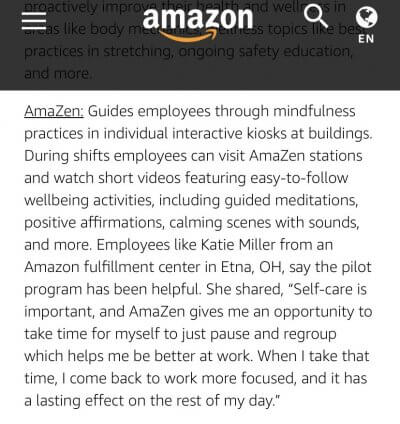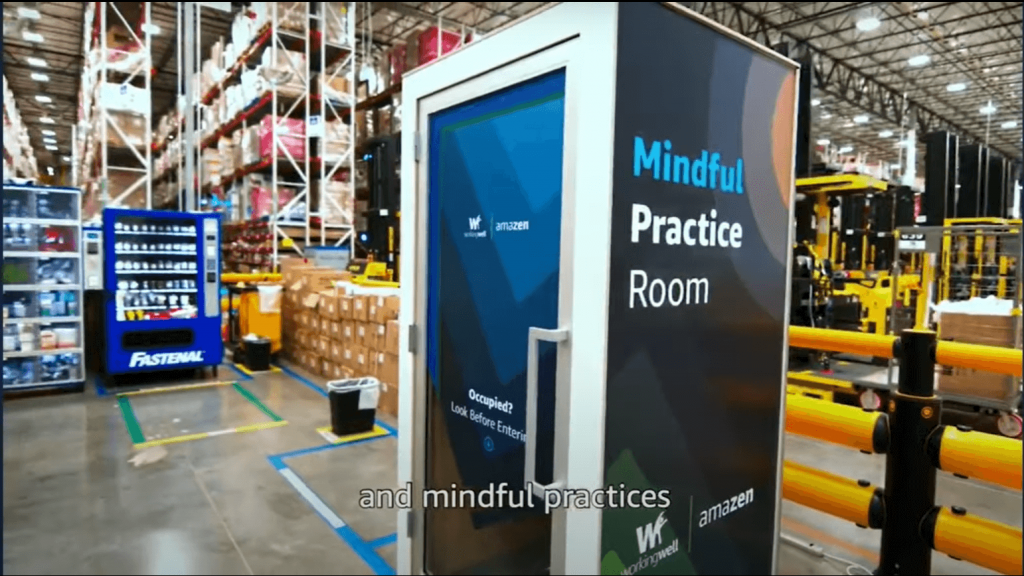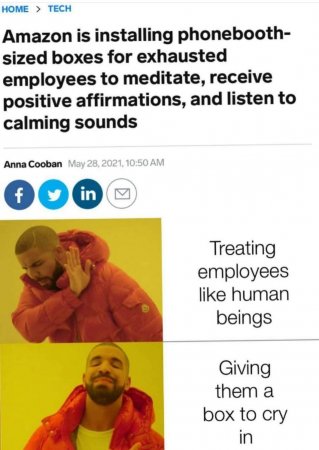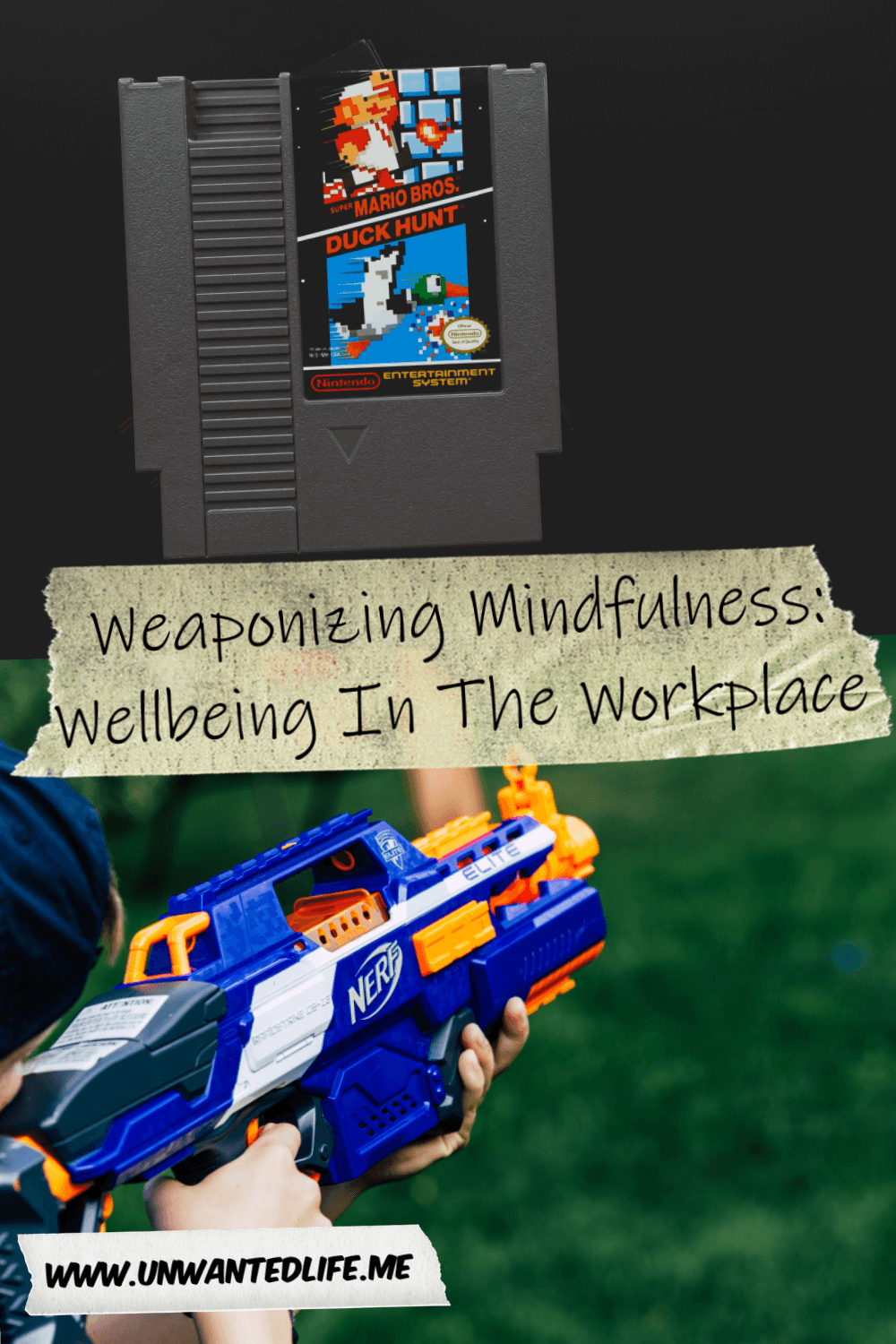The wellness and wellbeing movement has been around for decades, and for the most part, their intentions are good. They want to help improve everyone’s wellbeing. It’s one of the reasons Positive Psychology has grown in popularity as well. However, the movement has also been hijacked by organisations that don’t have the wellbeing interests of their employees at heart. For companies like these, their intention is weaponizing mindfulness for ulterior motives.
Mindfulness And Wellbeing
Mindfulness and wellbeing initiatives in the workplace can be a benefit to employees if done right. For example, having mentors at work whom you can talk to about the issues you may have is good for our wellbeing, as it gives us a safe space to talk. Some companies have also started to make mindfulness and wellbeing apps available to their employees, such as Woebot.
A systematic review and meta-analysis study conducted by Bartlett et al. (2019) has shown that mindfulness training delivered in the workplace can cultivate employee mindfulness. It can also reduce perceived stress, anxiety, and other psychological distress, and can also be beneficial for wellbeing and sleep quality. This is supported by a review by Allen et al. (2015) who found that mindfulness-based training can reduce employee stress and strain. Thus, mindfulness, much like wellness and wellbeing in the workplace, can have a positive effect if used correctly.
In 2016, 137 million sick days were taken in the UK, of which 15.8 million days were due to mental health issues, as reported by the BBC. Thus, companies and organisations are attempting to get more engaged with mindfulness, wellbeing, and wellness initiatives because simply put, their employees are their “human capital” and sick days cost them human productivity.
Weaponizing Mindfulness To Circumvent Responsibility
One of my partner’s pet peeves is wellness, wellbeing, and mindfulness in the workplace, because, as they said:
It’s thrown at people as a cure-all and an excuse not to take action to address the reasons they’re stressed or unhappy and it encourages people to passively accept their situation rather than doing something about it
The problem is that mindfulness meditation is often about accepting the present, but it’s the present work environment that’s causing the issues, so accepting them won’t help. What’s really needed in this situation is for conditions to change, not you accepting the conditions as they are, and there lies the problem with most implementations of mindfulness. It costs more money to make positive changes rather than weaponizing mindfulness, so you’ll accept the situation you’re stuck in.
Rather than removing the source of stress, whether that’s unfeasible workloads, poor management or low morale, some employers encourage their staff to meditate: a quick fix that’s much cheaper, at least in the short term
After all, we can all benefit from an empathetic leader and boss in the workplace (Office Angels). I know I’ve ended up with a manager during my placement that was ridiculously bad in their role which was terrible for my wellbeing. I wasn’t able to do a single placement hour, which almost cost me my postgraduate degree. Instead of that manager owning what they did wrong, the company tried to pin the blame on me because I was just a placement volunteer. Bad managers are terrible for workplace wellbeing.
But it’s not just that, there are also downsides to mindfulness in the workplace. A series of experiments by Hafenbrack and Vohs (2018) found that an 8–15-minute session of meditation mindfulness often weakened task motivation, rather than improving it. Therefore, mindfulness may be able to help you with stress, but at the same time, it can also demotivate you, resulting in there being no difference in overall work performance.
Also, there’s the issue that some mindfulness practices in the workplace are just awkward, rather than beneficial, and if you’re anything like me, they can also trigger a psychotic episode. For me, a lot of the mindfulness interventions are actually huge triggers for my anxiety induced-psychosis, which I’ve talked about in detail in my ‘Mindfulness And Its Downsides: My Anxiety Disorders Vs Mindfulness’ article, which you can read by clicking here.
If people are forced to do mindfulness that they find uncomfortable to participate in, then that’ll have negative consequences, rather than the planned positive ones. In fact, 25.6% of people in a study by Schlosser, Sparby, Vörös, Jones, and Marchant (2019) reported having unpleasant meditation-related experiences. With over a quarter of people having bad experiences, that figure can’t be ignored on how it’ll affect your employees and productivity.
However, there’s a difference between organisations trying to do something they think will help their employees and unintentionally weaponizing mindfulness and companies actively weaponizing mindfulness: Amazon.
Amazon’s Sycophantic Mindfulness Stunt
Although there are some companies that seek to embrace wellness, wellbeing, and mindfulness in the workplace for more noble reasons, there are organisations like Amazon that are using it solely for sycophantic PR point scoring. Amazon isn’t interested in tackling the mountain of issues that run rampant within its business. Issues are solely caused by the way Amazon has decided to treat their employees. Amazon isn’t interested in changing its unreasonable work conditions and inhuman work targets.
Recently, Amazon has decided that they’ll introduce AmaZen kiosks rather than change the way they treat their employees. I first read about this over on God, with further credit to Alex Press who tweeted the below image of the AmaZen kiosks.

Image: Alex Press
Are we to believe that Amazon won’t penalise employees for missing their inhumane Amazon work targets, where workers have had to pee in bottles to stick to those targets, to spend time using an AmaZen box? Of course not.
It’s highly unlikely Amazon will somehow allow workers to find time in those overworked schedules (The Guardian) for a mindfulness break during work. Amazon has been mired in workers’ rights issues for years, with former Amazon warehouse workers complaining of timed toilet breaks and punishments for talking (Channel 4 News) to employees being fired for asking for safer conditions during the pandemic (The Guardian).
If Amazon really wanted to help with their employee’s wellbeing they’d change their targets to something more realistic for a human being to complete.

Image: Amazon
These mindfulness AmaZen boxes look no different to a phone booth, but some might argue they’re basically upright coffins, which is the perfect metaphor for how Amazon will work you to death. I wonder if they’re soundproof so that you can scream in there instead? I’m sure that’s what Amazon employees would really use them for, that or so they can pee in bottles in private.
one of the largest companies in the world is offering its overworked employees a, well, box to sit in to watch mindfulness videos
This is nothing more than a PR stunt that not only hurts Amazon employees but also the efforts of the mental health and wellness community at large who try to get true wellness incorporated into everyday life. Such improper use of wellness, wellbeing, and mindfulness undermines all the hard work of mental health organisations, like Time to Change, all over the world. Amazon has been allowed to get away with not even doing the bare minimum to provide a good working environment, and it needs to stop because this isn’t how you manage workplace stress and distress.

Or as my partner would say:
If you’re stressed at work, it’s your fault for not doing enough mindfulness
Simply put, the only real cure for work-related stress and poor mental health is improved work conditions. Anything else is like applying a Band-Aid to a broken leg.
Does your workplace engage in this kind of fake caring or are you working for a company that genuinely tries to support its employees? Let me know in the comments section below.

The Government Weaponizing Mindfulness
Friedli and Stearn (2015) conducted a study into the UK government’s attempts to weaponizing mindfulness, wellbeing, and wellness to modify behaviour to what the government thinks are work-acceptable attitudes, personality, and beliefs. In short, the government is stating that unemployment is the result of personal failure and psychological deficit, rather than as a result of social and economic inequalities. The result of this is state-contracted and state surveillance of psychosocial interventions.
This came to a head at a Streatham Jobcentre where a protest broke out against a pilot scheme that forced people claiming unemployment to attend mental health support (SWLondoner). The scheme meant there would be a mental health clinic in the Jobcentre itself, with fears that it’ll be linked to the government’s already callous sanction regime.
For some reason, rather than giving more funding to the NHS mental health services, they would rather install mental health clinics in Jobcentres, which raises a lot of questions about confidentiality. Fortunately, due to public outcry, the scheme and the policy behind it were scrapped.
But that’s enough about Amazon and the government. If you’re a business owner and you want to do right by your business and your employees, then consider conducting occupational health assessments and improve your company’s wellbeing.
Have you experienced your government trying to weaponize mindfulness and wellbeing for reasons that aren’t in your best interests? If so, let us know in the comments section below.
As always, leave your feedback in the comments section below. Also, feel free to share your experiences with workplace wellbeing initiatives and weaponizing mindfulness in the comments section below as well. Don’t forget to bookmark my site and if you want to stay up-to-date with my blog, then sign up for my newsletter below. Alternatively, get push notifications for new articles by clicking the red bell icon in the bottom right corner.
Lastly, if you’d like to support my blog, you can make a donation of any size below. Until next time, Unwanted Life readers.
References
Allen, T. D., Eby, L. T., Conley, K. M., Williamson, R. L., Mancini, V. S., & Mitchell, M. E. (2015). What do we really know about the effects of mindfulness-based training in the workplace. Industrial and Organizational Psychology, 8(4), 652-661. Retrieved from https://dx.doi.org/10.1017/iop.2015.95 and https://www.researchgate.net/publication/289525931_What_Do_We_Really_Know_About_the_Effects_of_Mindfulness-Based_Training_in_the_Workplace.
Bartlett, L., Martin, A., Neil, A. L., Memish, K., Otahal, P., Kilpatrick, M., & Sanderson, K. (2019). A systematic review and meta-analysis of workplace mindfulness training randomized controlled trials. Journal of occupational health psychology, 24(1), 108-126. Retrieved from https://doi.org/10.1037/ocp0000146 and https://eprints.utas.edu.au/29794/1/OCP-2017-0855%20BARTLETT%20et%20al%20Accepted%20Manuscript.pdf.
Friedli, L. & Stearn, R. (2015). Positive affect as coercive strategy: conditionality, activation and the role of psychology in UK government workfare programmes. Medical Humanities, 41, 40-47. Retrieved from https://mh.bmj.com/content/41/1/40 and https://www.researchgate.net/publication/277893706_Positive_affect_as_coercive_strategy_Conditionality_activation_and_the_role_of_psychology_in_UK_government_workfare_programmes.
Hafenbrack, A. C., & Vohs, K. D. (2018). Mindfulness meditation impairs task motivation but not performance. Organizational Behavior and Human Decision Processes, 147, 1-15. Retrieved from https://doi.org/10.1016/j.obhdp.2018.05.001 and https://carlsonschool.umn.edu/sites/carlsonschool.umn.edu/files/2019-04/hafenbrack_vohs_2018_obhdp_mindfulness_impairs_motivation_0.pdf.
Schlosser, M., Sparby, T., Vörös, S., Jones, R., & Marchant, N. L. (2019). Unpleasant meditation-related experiences in regular meditators: Prevalence, predictors, and conceptual considerations. PLoS One, 14(5), e0216643. Retrieved from https://doi.org/10.1371/journal.pone.0216643 and https://journals.plos.org/plosone/article?id=10.1371/journal.pone.0216643.


Another very informative post, thank you. I think that, historically, many smaller firms have perhaps been reluctant to address the topic because they simply didn’t have the resources. However, there are now many online options that enable such firms to subscribe to a service that employees can access – not just webinars (although these can be very helpful) but also confidential support lines.
Indeed there are a lot of things available now for smaller companies. But there’s never been an excuse for large multinational companies not to have the resources to provide better working conditions and real mindfulness and wellbeing support
Another stirring piece that has got my brain ticking away. I feel really lucky to be working with a company that encourages mindfulness, confidence and time away from your laptop. It’s a real step change to where I’ve worked previously
Rosie
Thank you. It seems you’re one of the lucky few who works for a company that’s trying to do wellbeing right
Another very informative and interesting post. it is true tang in the past small companies didn’t address this topics. thanks God this is changing
Thanks for sharing
https://uncuaderno4cero.wordpress.com/
Thank you. It’s not just small compaines that aren’t addressing it, a lot of big ones aren’t either
Thanks for this informative post. I am fortunate to work for a company that genuinely cares about the wellbeing of its employees. We have lots of great wellness programs. During the pandemic, there has been an increased focus on work-life balance and mental health. As an example, to encourage employees to take their vacation time, the company gave us all an extra 5 paid days off in 2021.
These programs have the potential to do a lot of good, but it’s a shame that some companies treat them as a band-aid without addressing the real issues.
That sounds like your company really stepped it up to try and support their employees during the pandemic
They did. I am very grateful to work for them.
So long as people believe that any time spent not working is unproductive, this will be a workplace struggle. A tough issue to solve.
Indeed, it’s perfectly fine to be unproductive when you’re not at work
Mindfulness in the workplace is so important, I work somewhere where they value mental health so it works wonders for me!
Love, Amie ❤
The Curvaceous Vegan
I’m glad you’re with an organisation that seems to be doing it the right way
Lovely detailed, informative post here! Mindfulness in the work place truly is very important, and we really do we need to talk about it. Thanks for sharing!
Thank you and thank you for sharing your thoughts
Very interesting piece. Really enjoyed reading it. Thanks for sharing. If you have time drop by World-Complete.com and take a look at my content.
Thanks
On one hand I think it’s a good idea that workplaces are introducing the concept of mindfulness into their spaces but on the other hand, this can be very performative. Instead of introducing these activities, what they could be doing is looking at how they can decrease the overall workload and stress of their employees or perhaps have one shorter working day. In other words they should actually be about it, rather than being seen to be doing so which gives them ‘ethical points’ in the public domain.
Indeed, too many companies just want to appear as though they’re doing something, when really all they’ve ever needed to do is address the workload to actually help their employees
I’ve never heard of companies using mindfulness for their employees. Most places I’ve worked for didn’t even pretend to give a shit about their employees; at least I know where I stand!
I’m very cynical about work places. Their attitude is that we’re all replaceable. Good article.
Yeah, a lot of companies simply don’t care and unfortunately, the general population seems to look down on people in certain jobs, thus allowing them to be treated worse with compaines getting away with poor working conditions
Loved this piece. Wow I had never thought about how a company could use mindfulness in such a way.
And OMG…the phone booth sized “mindfulness box” where u can watch videos? That just sounds creepy to me.
I just can’t.
It’s clearly a crying and screaming booth
Your angle is very interesting. Definitely some company addresses the wrong thing. Thanks for the informative post
Thanks
My last workplace tried to implement some mindfulness strategies, but badly. To be fair, the people who were supposed to be doing the training didn’t get appropriate training themselves. It was a mess. Some departments did okay with it, but others had management teams that tried to turn it into some kind of toxic positivity movement.
Amazon’s booths are a nightmare straight out of dystopian fiction. Honestly, everything about Amazon is a nightmare.
That’s the problem with positively, it can be really toxic. Relentless positively can never be healthy.
I absolutely hate Amazon, they’ve treated there employees so poorly for so long, and have been getting away with it because they’re too big a company. People will use Amazon even though they have terrible working conditions. I refuse to have anything to do with Amazon, even though it costs me income to do so as a blogger.
These are excellent points!! So true!
Thanks
Huh. I never even thought of this before. Very interesting topic.
Thanks
This post was eye-opening: we did a mindfulness training back with my old company and I can confirm nothing came of it, absolutely nothing. It’s a disgrace that some companies feel like just giving you a taste it’s plenty. I’m sorry about your experience with that manager, sometimes people cannot admit to themselves when they do wrong as they do not want to come through as that. One thing I learnt is that owning up to your mistakes can only be a benefit, and there is no way I am going to blame someone else for my mistakes, no matter the repercussions. As usual, a great and informative post!
Thank you. Yeah, too many compaines just want to play lip service. Rarely do they actually want to make things better
Mindfulness in the workplace is so important. I recently left a job where it wasn’t really valued and I’m so much happier now.
Claire.X
http://www.clairemac.co.uk
Hopefully you’ve moved on to a place that treats you better
I have a friend who has going though something like this. The job just expects the person who just keep working and no work life balance. It’s sad when jobs do this to their employees. Hopefully for jobs will understand work life balance.
Too many organisations operate like that
This was a fascinating read! I’ve written a post a while back about how people suggest mindfulness as some kind of panacea to all issues. And whilst it has it’s place it’s not a replacement for actual support for stress etc. And like you say, it’s also not for everyone so pressuring people into doing it as the only way to help themselves can be dangerous if it is triggering. Plus lots of mindfulness classes aren’t run by actual trainers who have the experience to manage any situations if people are triggered
Thank you. No matter how good the mindfulness programme might be, it’s still not going to be as good as improving actual work conditions
I love this post. I don’t work yet but I know a lot of people who work in companies that don’t give a darn about their wellbeing and it infuriates me. Companies are meant to prioritize the wellbeing of their staffs. Very informative post, I learnt a lot. x
Thank you. I doubt compaines will ever step up and do right by their employees unless our governments make it a legal requirement to do so
Lots of helpful information! At my job there are really stressful periods. I don’t think that the company cares for the employees, their mental health and their level of stress. They actually consider it as the norm and when you express it you are the too sensitive person. It is really bad cause I hear the same from most of my colleagues.
I really hope things were different or I was different in the way I am dealing with it.
Thanks for sharing ?
Too many organisations are happy to run you ragged until you burn out
Another compelling post! I hadn’t realized that mindfulness practices were being abused by employers this way. Then again, it makes perfect sense. I like you analogy of putting a band-aid on a broken leg. Employers refusing to take the time to fix the internal problems are trying to victim blame their employees. No wonder people are just quitting without a plan.
Thank you. I guess it’s just easier to lay the blame on the employees rather than taking responsibility for their poor working conditions
Thank you for sharing this insightful post. Wellbeing in the workplace is so important- and so it’s awful to find that some companies use it to further their own motives when it comes to looking out for their employees x
Unfortunately it’ll likely keep being abused by some organisations until it’s properly covered in law
Such a great post. It is very important to be able to have mindful wellbeing support. I believe there will be an increase in productivity and interaction with this in place. I am aware of a company that gave 1/2 hour mental health breaks once a day for the entire month last month for mental health awareness but I believe it would be a healthy habit to maintain for the workers. ?
It’s a nice token gesture, but ultimately meaningless when these mental health breaks are only for a month. Mental health won’t stick to such a schedule
It is not just mindfulness that is weaponized these days! I feel like many big companies will do anything to draw attention to themselves, even if their advocacies and put-forward practices are, in actuality, quite shallow. The concept behind an AmaZen box is a cute one, but allowing people the time to use it or, better yet, improving conditions to the point where it is not even needed, is a whole other matter and one that, as you say, most people do not want to address.
Thanks for sharing your thoughts on this! Weaponization makes it hard for the authentic practicers to get the attention they deserve . . .
Yeah, a lot of companies will pay lip service to causes that the public are in favour of, but besides to themed advertising, they rarely do anything that’ll bring about change
I feel as though Amazon just do anything for press and nothing for their employees – they just have such a bad reputation that anything they say they will be doing going forward just doesn’t have much substance. It’s a shame, a lot of huge corporations just use it as a box ticking exercise!
Amazon is just the worst company, but everyone looks at it’s founder as some sort of role model
Nice blog with great post, Thanks for sharing!
Thanks
This was such a great and informative post! I am sorry for what you had to go through with that manager, I think that in companies when they are higher up the hierarchy, it’s easy to pin it on others when people do wrong. I completely agree that the system its what need to change, not expecting that a mindful video can do the work on his own! I had previously worked for a company that on paper talked about being mindful and did nothing at all in concrete!
Thank you. Too many companies play lip service to doing the right thing but there’s never any real follow through
I’ve been out of work for 11 years now (mum duties) but when I did work they never cared when you had a bad mental health day. I cannot believe those boxes Amazon had!
Words can’t describe how much I hate Amazon and the way it treats it’s workforce
Very exciting blog with great post.
Thanks
This was really eye-opening